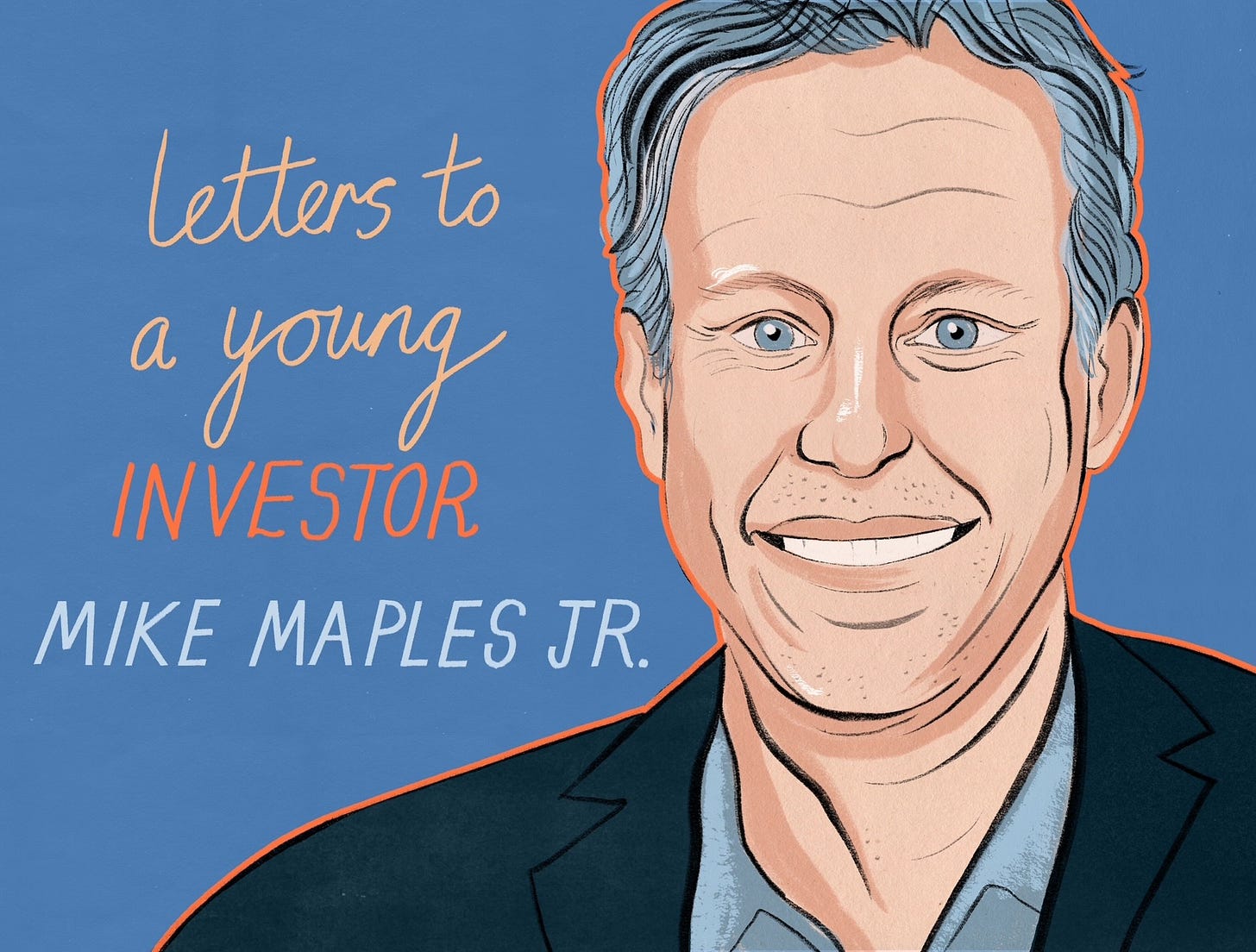Letters to a Young Investor: Mike Maples, Jr.
The Floodgate co-founder on backing Twitter and missing Figma.
“I’m new to VC and you’ve given me access to learnings from the best of the best! Appreciate you!” — Zhu, a paying member
Friends,
At its core, “Introduction to Poetry” by Billy Collins is about the difference between the drive to define something and the drive to understand it. In a few sparse lines, Collins contrasts the way he wishes readers would appreciate poetry with the manner in which so many do so. Rather than appreciating its contours and marveling over its intricacies, most readers prefer to pummel a poem for information. Instead of holding it to the light “like a color slide” or “waterski[ing]” across its surface, they “begin beating it with a hose/to find out what it really means.” In their drive to define the work in front of them – to analyze and probe it – Collins’ readers neglect its beauty, and miss what really makes it tick.
Though Collins is talking about poetry, he could just as well have been describing any craft. No matter the discipline, there is always this tension between defining and understanding, controlling and observing, grasping and witnessing.
When it comes to the craft of venture capital, Mike Maples, Jr. is one of its great appreciators. Over the past two decades, the Floodgate co-founder has built a remarkable track record by attuning himself to the frequency of great entrepreneurs, observing their quirks, and seeking to understand. As Mike himself describes it, his praxis is not about thinking faster or exhaustively analyzing a market, but simply listening differently. That approach has allowed Mike to make many outlier investments long before they broke out, backing Twitter, Twitch, Okta, and Applied Intuition in their messy infancies.
As part of The Generalist’s “Letters to a Young Investor” series, we’ll explore the nuances of Mike’s craft. To learn how one of the best early-stage investors of the past twenty years spots the future and identifies anomalies, read on. To enjoy the full correspondence and the rest of The Generalist’s exclusive interviews, join as a premium member for just $22/month. For the price of a single business lunch, you’ll unlock the strategies of some of the world’s best investors, founders, and operators.
Brought to you by Mercury
VC checks may be shrinking, but ambition is on the rise.
Mercury’s 2025 data report, The New Economics of Starting Up, surveyed 1,500 early-stage founders across funding, AI adoption, hiring, and more. For investors, it’s a signal worth watching. Founders aren’t slowing down — they’re rewriting the playbook.
Here’s a preview of what they learned:
Self-funding is the number one avenue for accessing capital — even for tech companies, with half likely to bootstrap.
87% of founders are more optimistic about their financial future than they were last year, despite prevailing uncertainties.
AI isn’t stymying job growth, like headlines would have you assume. 79% of companies surveyed, who have adopted AI, said they’re hiring more because of it.
Mercury believes banking* should do more for the builders of the next great companies. Like, provide the intel you need to adapt in this market.
*Mercury is a financial technology company, not a bank. Banking services provided through Choice Financial Group, Column N.A., and Evolve Bank & Trust; Members FDIC.
Mario’s letter
Subject: Finding pattern breakers
From: Mario Gabriele
To: Mike Maples, Jr.
Date: Tuesday, October 7 2025 at 4:20 PM BST
Mike,
I’m sitting down with a cup of coffee, a stack of notes, and a well-worn copy of Pattern Breakers to begin this correspondence with you. It’s one that I’ve been looking forward to for some time, admiring your career for many years. That’s as much to do with the respect with which other investors talk about your work, as the formidable string of winners you’ve backed. You have always struck me as a true venture craftsman, with an unfakeable obsession for startups.
Reading Pattern Breakers only makes this sincere fascination more evident. I wish more exceptional investors would take the time to transcribe and distill their insights so thoughtfully. As you know better than I do, so much of early-stage investing relies on intuition and subtle signaling – a reality which often makes it difficult for even great practitioners to articulate their work. That can lead to the impression that venture capital is pure luck. No one can deny chance’s role, but to minimize it to spinning a roulette wheel misses the hazy art that the best have mastered.
Pattern Breakers is an insightful articulation of your version of the craft. It outlines the lessons you’ve deduced across twenty years of investing and countless hours of further research. It contains many wonderful observations I find myself mulling over regularly. One particular favorite is that great startups force a choice, not a comparison. As you note, Airbnb did not try to build a better version of the Four Seasons, but competed on entirely new terrain. While the Four Seasons promises to deliver a high-quality, consistent experience, Airbnb offers authenticity, giving travelers the chance to “live like a local.” Neither is inherently superior. Rather, they appeal to different customers and sensibilities. I’ve found myself returning to this heuristic repeatedly since I learned it.
To set the stage for our conversation, I’d love to dig into Pattern Breakers more deeply and examine the philosophies animating your investing. Rather than asking you to rehash the book’s major points (which I recommend readers enjoy wholesale), I wondered if we might try to understand its ideas “in action,” so to speak.
To paint a familiar scenario: Imagine a founder has walked into Floodgate’s offices to pitch you for the first time. How do you go about assessing whether you might have a pattern-breaking business on your hands?
I am sincerely interested in this at the most granular possible level. Do you prefer to sit directly across from an entrepreneur or kitty-corner to them? Do you prefer going for a walk to a formal pitch? Does it help you ask better questions to review materials beforehand, or do you want to hear everything fresh? To what extent are you analyzing small clues about their posture, attire, speaking speed, and so on? Are there any initial indicia that excite you? These might sound frivolous to some readers, but I’m increasingly of the opinion that these little details really influence the conversation you’re able to have.
We could spend a full other letter on questions alone. Which are among your favorites? (Bezos reportedly loved, “Are you a lucky person?” for example.) Which questions give you signal most frequently? You’ve noted before that you liked to ask, “Is this from the future?” What does that question tell you? How long does it take to realize a business might be truly special? How long do you take to make up your mind? What does your internal process look like to get to conviction? How much still, after all these years, comes down to feel? How much time do you spend analyzing the person versus the idea?
While reading your book, I found myself thinking about the tension between assessing an idea and assessing a person. Pattern Breakers covers both, but at least in my reading, it is primarily interested in the characteristics of game-changing ideas. You elegantly outline the importance of a startup building on (1) an “inflection” – some material technological, commercial, or sociological change, and (2) an “insight” around it. Lyft is a good example: Logan Green and John Zimmer recognized that smartphones with GPS were an inflection point, and then had the insight that this might enable a new kind of taxi network.
But you’ve remarked that 80% of your best investments came from pivots. Which makes me wonder: what signal do you get from a startup idea, knowing that it’s liable to change? Is it simply a proxy for a founder’s insightfulness and acuity? Are you using the current canvas to understand how their mind works? Or do you need to sincerely feel as if there’s an inflection and insight at the heart of it?
More broadly, what do you look for in a person? You’ve written about the importance of disagreeableness. Do you try to test for that explicitly? How so? Are there certain patterns you’ve noticed recur across outlier people? What shared alleles might you find if you put Ev Williams, Emmett Shear, Todd McKinnon, and Logan Green under a microscope? I am certain they have more differences than similarities, but equally convinced that there must be some unifying quality.
With much appreciation from one venture “anorak” to another,
Mario
Mike’s response
Subject: When Tomorrow Shows Up Early
From: Mike Maples, Jr.
To: Mario Gabriele
Date: Friday, October 17 2025 at 7:40 PM PST
Dear Mario,
I really like your questions, because they get to the messy part of seed investing. It’s not about spreadsheets or pattern-matching. It’s about sensing whether someone is already living in the future and inviting the rest of us to catch up. You’re not just asking about mental models. You’re asking about the feel.
One of the first times I felt the future, I was in a Palo Alto cafe, and a 23-year-old Justin Kan walked in. He had a webcam strapped to a baseball cap and a mess of wires leading to a backpack. I was already skeptical. And that was before he said he planned to livestream his life. All of it. Twenty-four hours a day, like an internet reality TV show. It almost sounded like a prank.
But then he spun his laptop around, and there I was, live on the internet.
Suddenly, it felt different, and my curiosity started to take over. “How did you do that, and what’s in your backpack?” I asked. Justin opened it, and inside was a Linux computer, a video encoder, EVDO cellular hardware, and some Python code held together mostly with duct tape and conviction. But it actually worked, and keep in mind this was in 2007. YouTube had only existed for 18 months. Most people still had flip phones.
The cafe hadn’t changed, but my sense of possibility had. It didn’t feel like a pitch anymore. It felt like stepping through a portal to a different future. He wasn’t selling me. He was already living in a different reality and offering me a fleeting glimpse. And even though there were many pivots and years between Justin.tv and what became Twitch, the basic insight that millions of normal people would want to stream content was right, no matter how heavily disguised it was in the initial idea.
For a long time, I confused being early with being smart. Seeing things first felt like a superpower. But the seed investors that are rewarded most are not the futurists who can predict. They’re the ones who notice. Catching radically new futures feels less like investing and more like witnessing.
There are a few small habits I find helpful when I’m trying to catch a pattern-breaking future described by a founder:
Don’t label startups. The moment you call something “Uber for X,” you lose too much resolution to see what’s truly different about it. Labels turn messy ideas into something that fits into our current understanding, but they make you believe you understand things you don’t. The best startups break the current patterns of our current understanding. When you jump too quickly to a label, you’re more likely to miss the small, magical details that matter most.


